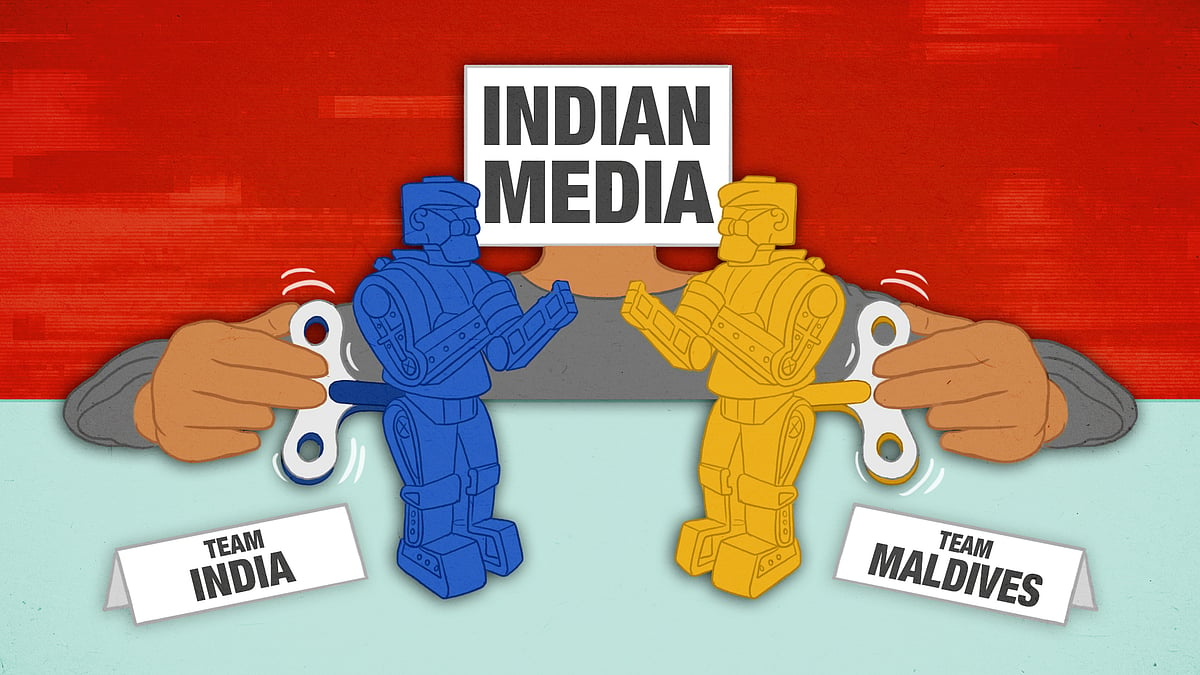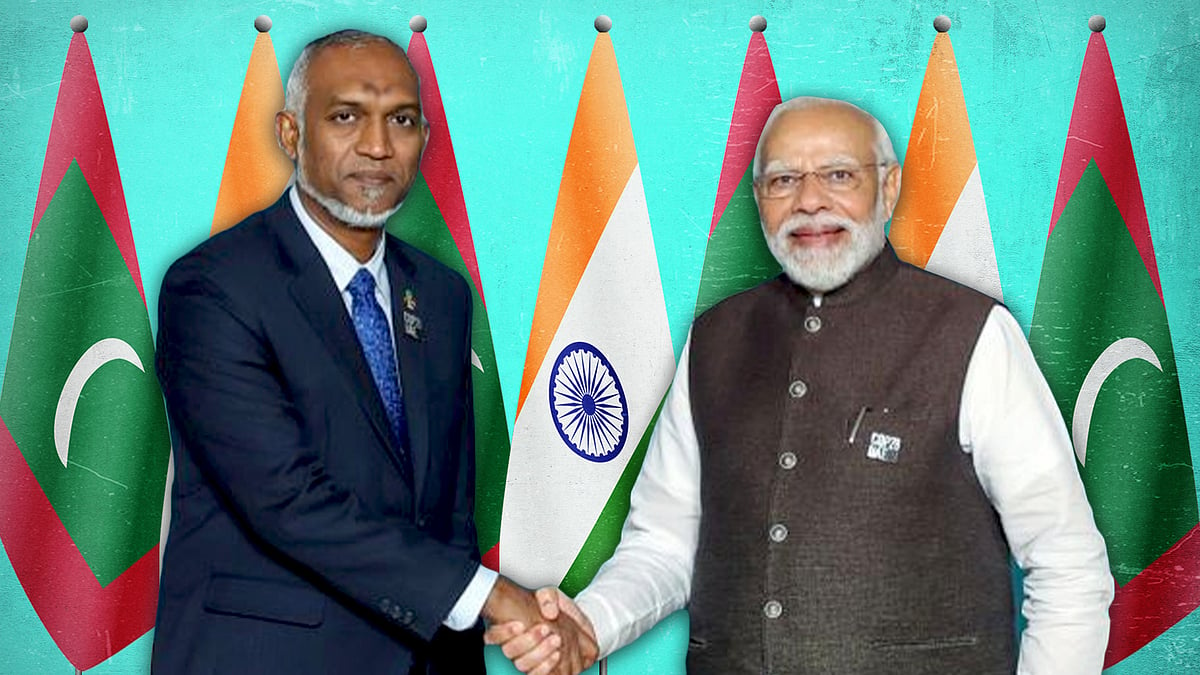As media fanned Maldives flames, silence on Lakshadweep’s ecology, Chhattisgarh forests
This is a precursor to what we can expect in the rest of this year.
Predictable, is it not, that the new year should get off to a flying start with a non-issue becoming a raging controversy, thanks to social and mainstream media. It is a precursor to what we can expect in the rest of this year.
On January 4, Prime Minister Narendra Modi visited Lakshadweep, a group of 36 islands in the Arabian Sea which is a Union territory. It is not clear what was the provocation for this visit. There are no elections on the immediate horizon. Then why?
In a carefully curated video and photographs that were released to the media and circulated through social media, Modi is seen, alone, on a sparkling white beach. He walks, sits, gazes out at the sea, all this with several changes of clothes. And then, wearing a bodysuit used for deep sea diving, he is seen snorkelling, accompanied by two divers. This is the only image where we see someone else.
The message in this promo, by none other than the prime minister, is that Indians should choose the beautiful beaches of the island territory for holidays and tourism.
What followed, of course, was more than just a rush of Indians to the Lakshadweep. The resultant ultra-nationalism, with celebrities and influencers making vapid statements about how Lakshadweep was better than the Maldives, another group of islands in the Arabian Sea with beautiful beaches and coral reefs, exposed the real intent behind the promotion.
India has been uneasy ever since Mohammed Muizzu was elected president of the island state in November last year. He has openly reached out to China and already signed 20 agreements as part of a bilateral Comprehensive Strategic Cooperative Partnership.
The economy of the Maldives is heavily dependent on tourism and Indian tourists constitute a substantial percentage. It appears that the “boycott Maldives” trend triggered by the Modi visit was not spontaneous. It has resulted in hyper-nationalism in India and sharp critical statements by ministers in Muizzu’s cabinet in response.
Apart from the strategic dimensions of this silly spat, the incident has underlined a couple of factors that are perhaps an indication of the way all media will be used in the future. One, that those with the skill to use social media can push agendas if mainstream media picks up the cue and follows the lead. The BJP has already shown its mastery in this regard. And second, that leading up to 2024, this is the kind of strategy that will be used increasingly to build up the image of Narendra Modi.
In the social media melee that followed the tourism promo, no one mentioned the environmental challenges that the Maldives already faces because of tourism. Troubled as it is with the prospect of sea level rise due to global warming, the island state has seen beaches disappear and its precious coral reefs being bleached due to the pollution caused by human intervention.
The Lakshadweep is safe for the moment because the tourist trade has not expanded. But after this little exercise, if it does – and there are already indications that the trend has begun – we will see an end to those pristine beaches and the coral reefs that have survived.
While these environmental aspects of opening Lakshadweep to tourism were barely discussed in the media, another major story that concerns the destruction of pristine natural forests has also got hardly any traction in mainstream media.
The Hasdeo Arand Forest in Chhattisgarh, described as “one of the last unfragmented forest landscapes in Central India”, will be decimated if expansion of the existing coal mines is permitted. Despite reports by two credible organisations, the Wildlife Institute of India and the Indian Council of Forestry Research and Education advising against expansion, the union government gave its clearance in 2022.
The decision has been met with vociferous opposition by the local Adivasi population. They have taken out massive rallies in the state capital Raipur. Yet, barring a passing news item or a small single column photograph, these protests have barely been covered. The mines, incidentally, are owned by Adani group.
According to an investigative story in Scroll.in a year ago, the second phase of the mining project, which envisages an expansion of the existing two mines in the Hasdeo Arand Forest, would result in 2.5 lakh trees being cut in an area of 1,137 hectares. The forest, spread over 1,500 sq km, is one of the few remaining untouched forests in central India. It hosts rare plants and several species of endangered animals.
But, as I have argued in earlier columns, saving the environment has become a passing concern in mainstream media. And governments, both state and central, are champions at churning out politically correct rhetoric even as their actions are leading to environmental devastation.
To end on a more positive note, the only bit of good news as we enter the new year has been the Supreme Court’s ruling in the Bilkis Bano case. It has ordered that the 11 men sentenced for life for murder and rape during the Gujarat violence of 2002, who were granted remission of their jail term by the Gujarat government, be sent back to prison. It has concluded that the remission order by the Gujarat government was fraudulent. This ruling has generated some optimism that perhaps justice is still possible.
Meanwhile, the Supreme Court has also taken note of a petition filed by a journalist about the way caste operates inside prisons and the casteist nature of prison manuals that are still being used in Indian jails in 2024.
This shocking revelation was made in 2020 by an excellent series of five articles in the Wire by Sukanya Shantha and Jahnavi Sen titled “Barred: the prison project”. They studied prison manuals in different states and spoke to prisoners belonging to the marginalised castes, especially Dalits.
What they found was perhaps not unusual given that caste continues to determine how Indian society is run. But the series revealed that official prison manuals laid down tasks that prisoners are expected to do while serving their sentences on caste lines. Thus, only upper castes are assigned cooking duties while Dalits have no choice but to clean. These manuals from colonial times have never been revised.
This quote sums it up:
“Caste-based labour, in fact, is sanctioned in the prison manuals of many states. The colonial texts of the late 19th century have barely seen any amendments, and caste-based labour remains an untouched part of these manuals. While every state has its own unique prison manual, they are mostly based on The Prisons Act, 1894. These jail manuals mention every activity in detail – from the measurement of food and space per prisoner to punishments for the ‘disorderly ones’.”
The expose was noted and appreciated when it appeared, and the journalists won awards. But the issue would have remained unaddressed had it not been for the decision of one of them, Sukanya Shantha, to follow up by going to court.
The hearings in the case have just begun in the Supreme Court. As prisons are under state governments, it has asked 11 states to look at their prison manuals. This could lead to important and long-term change.
The lesson to draw from this is that sometimes journalists cannot rest after they have done a path-breaking investigative story. In a society, and particularly today when both politics and mainstream media seem determined to distract rather than inform, there is little choice before journalists but to follow up on the information unearthed and find ways to make the change happen. This is what Sukanya Shantha from The Wire has done by filing her case.
If you’re reading this story, you’re not seeing a single advertisement. That’s because Newslaundry powers ad-free journalism that’s truly in public interest. Support our work and subscribe today.
 Maldives misadventures, featuring Muizzu govt and the media
Maldives misadventures, featuring Muizzu govt and the media In Maldives, Delhi must steer clear of irritants to use mix of Gujral doctrine, tough talk
In Maldives, Delhi must steer clear of irritants to use mix of Gujral doctrine, tough talk Maldives as a metaphor
Maldives as a metaphor